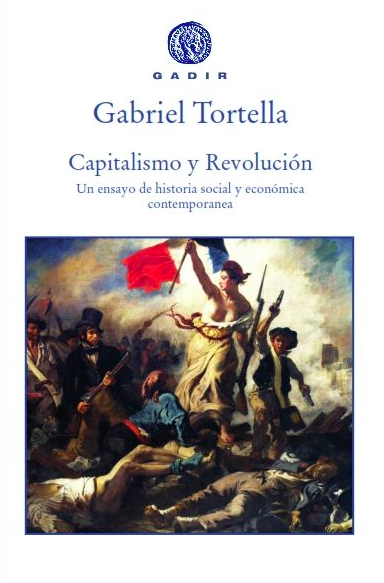[Gabriel Tortella, Capitalism and Revolution. One essay of contemporary economic and social history. Gadir. Madrid, 2017. 550 pages]
review / Manuel Lamela Gallego
The main goal The aim of this book is to offer an extensive view of contemporary history, in order to make us able to understand the wonderful, yet overwhelming, complexity of the world in which we currently live. To accomplish this task, the work has a real approach multidisciplinary, with economic history as the focal point meeting and reference letter for the rest of the social sciences. Consequently, the book offers us an accurate economic and social analysis, but without ever forgetting the political, a factor that the author considers essential for the true understanding of past events.
With this look at the past in order to observe the near future with greater lucidity and clarity in the final chapters, Gabriel Tortella completes, improves and nourishes with a greater issue of reflections and thoughts in his previous work, "The Origins of the Twentieth Century" (2005). Economic historian of B After an academic life and internationally recognized, the author presents us with an entertaining study that will undoubtedly awaken in the reader an interest in the study of contemporary history.
To do this, the author takes us by the hand to what he calls the first World Revolution (the author actually goes back to more remote times to, in a brilliant chapter, explain the triumph of Europe and how it will lead and lead this process). This development The historical revolution is made up of the so-called Atlantic revolutions or bourgeois revolutions, led by England (17th) and Holland (16th-17th) and followed by the rest of Europe and the American continent during the last decades of the eighteenth century and almost the entire nineteenth century. Finally, the Industrial Revolution that began in the British Isles during the eighteenth century brought this First World Revolution to a close.
Already here, the author tells us sample his acuity as a historical analyst in distinguishing between the bourgeois revolution and the industrial revolution, concluding that an evolutionary process is being followed: first, a revolution of a political nature is necessary that results in advances both at the social and economic levels, as was the case in England, with an increase in maritime trade, development parliamentarism, changes in agriculture... The latter will eventually lead to an Industrial Revolution where progress and improvement will be total and will encompass all areas of human society. This reflection explains and crystallizes the status It was lived in Europe during the eighteenth century, where we found societies like the English, practically submerged in its industrialization, and at the same time societies like the French, still immersed in its bourgeois revolution.
 |
The author marks another turning point in the historical evolution at the end of the Belle Époque and the beginning of the First World War, in 1914. As he did previously, he will name the process, which began in the early part of the 20th century and culminated in its second half, as the Second World Revolution. When the author speaks of revolution, he is in no way referring to the Russian Revolution or Bolshevik Revolution of 1917, nor to the series of totalitarianisms that arose during the interwar period. For Gabriel Tortella, these events are nothing more than monstrous experiences destined to remain silent in the dustbin of history. When the author speaks here of revolution, he is referring to the consolidation of the social-democratic state based on the economic theory of John Maynard Keynes.
Next, the author makes a historical-economic review, reaching the economic recession that occurred in 2008. The author concludes by explaining the reason for the triumph of capitalism: a capitalism undoubtedly renewed and shaped by the different crises that have occurred since 1945. A conclusion that can be summed up in the almost prophetic phrase used by the author of: "Tomorrow Capitalism" (p. 498).
Tortella devotes the last pages of his book to reflecting on the present and the time to come. Taking stock of the last 250 years and far from dark futures, we sample how humanity, after several decades of a development Unprecedented, it is at its peak in terms of living standards and conditions. Despite this well-founded optimism, the author also warns us of serious problems that humanity will have to face in order to move forward in its progress. The author considers the overpopulation and lack of demographic control in third world countries to be the great problem of our time.